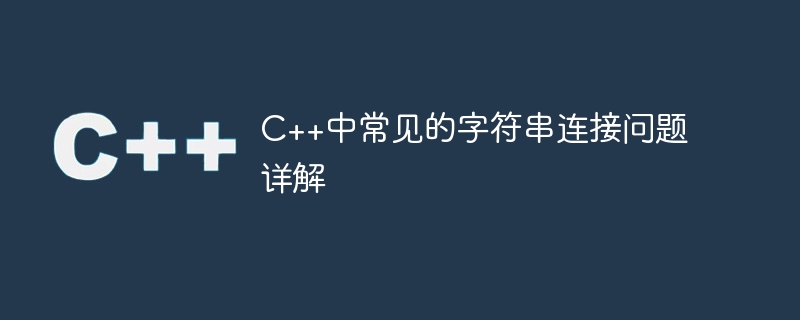

Detailed explanation of common string concatenation issues in C
In C programming, string concatenation is a common operation. String concatenation refers to splicing two or more strings together to form a new string. This article will introduce in detail common string concatenation issues in C and provide specific code examples. The following aspects will be discussed below.
1. Methods of string connection
In C, we can use a variety of methods to connect strings. The following are several common methods:
(1) Use the " " operator: Strings in C support the " " operator. We can directly use the " " operator to concatenate two strings together. . For example:
std::string str1 = "Hello"; std::string str2 = "World"; std::string result = str1 + " " + str2;
(2) Use the std::stringstream class: The std::stringstream class is a string stream class provided by the C standard library, which can easily perform string splicing operations. For example:
std::stringstream ss; ss << str1 << " " << str2; std::string result = ss.str();
(3) Use the append() method of std::string: The std::string class provides an append() method that can be used to append strings. For example:
std::string str1 = "Hello"; std::string str2 = "World"; str1.append(" "); str1.append(str2);
The above are several common string connection methods. The specific method to use can be selected according to the actual situation.
2. Performance issues of string connection
When performing string connection, performance is an important factor that needs to be considered. In C, strings are immutable objects, which means that every time a string concatenation operation is performed, a new string object will be created. Frequently creating and destroying string objects will cause certain performance losses.
In order to improve performance, we can use the following two methods to avoid frequent creation and destruction of string objects:
(1) Use the reserve() method of std::string: std: The :string class provides a reserve() method, which can reserve a certain amount of space to avoid frequent memory allocation. For example:
std::string result; result.reserve(str1.length() + str2.length() + 1); result = str1 + " " + str2;
(2) Use the append() method of std::string: The std::string class provides an append() method, which can be used directly without creating a new string object. Append content to the end of an existing string. For example:
std::string str1 = "Hello"; std::string str2 = "World"; str1.append(" "); str1.append(str2);
3. Code Example
The following is a complete code example that demonstrates the use of different methods for string concatenation.
#include#include #include int main() { std::string str1 = "Hello"; std::string str2 = "World"; // 使用"+"运算符 std::string result1 = str1 + " " + str2; // 使用std::stringstream类 std::stringstream ss; ss << str1 << " " << str2; std::string result2 = ss.str(); // 使用std::string的append()方法 str1.append(" "); str1.append(str2); std::cout << "result1: " << result1 << std::endl; std::cout << "result2: " << result2 << std::endl; std::cout << "str1: " << str1 << std::endl; return 0; }
The above code will output the following results:
result1: Hello World result2: Hello World str1: Hello World
Through the above code examples, we can clearly see the use and results of different string concatenation methods.
Summary:
This article details common string concatenation issues in C and provides specific code examples. When concatenating strings, we can choose to use the " " operator, the std::stringstream class, or the append() method of std::string. In addition, when considering performance issues, you can use the reserve() method or append() method of std::string to optimize the operation. I hope this article will be helpful to you in your application of C string concatenation!
The above is the detailed content of Detailed explanation of common string concatenation problems in C++. For more information, please follow other related articles on the PHP Chinese website!
 pdf to xml format
pdf to xml format My computer can't open it by double-clicking it.
My computer can't open it by double-clicking it. ps delete selected area
ps delete selected area How to solve http request 415 error
How to solve http request 415 error insert statement usage
insert statement usage Mathematical modeling software
Mathematical modeling software How to solve the problem that tomcat cannot display the page
How to solve the problem that tomcat cannot display the page vcruntime140.dll cannot be found and code execution cannot continue
vcruntime140.dll cannot be found and code execution cannot continue



